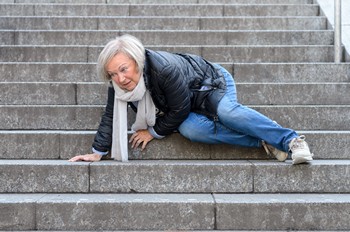Preventing Falls
 The normal changes of aging, like poor eyesight or poor hearing, can make you more likely to fall. Illnesses and physical conditions can affect your strength and balance. Poor lighting or throw rugs in your home can make you more likely to trip or slip. Footwear that is unsafe or inappropriate for the walking surface may also cause you to lose your balance.
The normal changes of aging, like poor eyesight or poor hearing, can make you more likely to fall. Illnesses and physical conditions can affect your strength and balance. Poor lighting or throw rugs in your home can make you more likely to trip or slip. Footwear that is unsafe or inappropriate for the walking surface may also cause you to lose your balance.
Each year in the US, more than 1.6 million older adults go to emergency departments for fall-related injuries. Among older adults, falls are the number one cause of fractures, hospital admissions for trauma, loss of independence and injury deaths. Making simple changes in your environment and your habits can help you avoid not just a fall, but the potential for a fractured or broken bone that might result from it.
How Can You Prevent Falls?
First, be sure your home is as safe as possible. Here are some tips:
- Wear shoes with nonskid soles.
- Be sure your home is well lit so that you can see things you might trip over.
- Use night lights in your bedroom, bathroom, hallways and stairways.
- Remove throw rugs or fasten them to the floor with carpet tape. Tack down carpet edges.
- Don’t put electrical cords across pathways.
- Have grab bars put in your bathtub, shower and toilet area.
- Have handrails put on both sides of stairways.
- Don’t climb on stools and stepladders. Get someone else to help with jobs that call for climbing.
- Don’t wax your floors at all, or use a non-skid wax.
- Have sidewalks and walkways repaired so that surfaces are smooth and even.
Click here for a more detailed, printable home safety checklist.
Next, get regular check-ups from your doctor, and take good care of yourself:
- Have your eyes checked every year for vision changes, cataracts, glaucoma and other eye problems.
- Have your hearing checked every two years, or anytime you or others think that you can’t hear well.
- See your doctor right away if you feel dizzy, weak or unsteady on your feet, if you feel confused, or if you fall.
- Let your doctor know if one of your medicines or the combination of medicines you take might be making you feel dizzy or lose your balance.
- If you are having balance problems, ask your doctor if a referral to the Balance Center would be advisable.
- If your doctor wants you to use a cane or a walker, learn how to use it--and then use it all the time.
- Get regular exercise, especially walking.
- Don’t smoke and limit your alcohol intake to two drinks or less a day.
West Virginians & Falls
A study published in the West Virginia Medical Journal documented the correlation between increasing age and less desirable outcomes for West Virginia seniors after a fall. Of 6,604 patients age 65 or older enrolled in the West Virginia State Trauma Registry, 83 percent (5,498 patients) were injured in a fall. Older adults have a different pattern of injury from falls than younger patients and have a higher rate of mortality, and the rate of death from falls in the elderly is rising. Of those who survive, there is a higher rate of placement in skilled-nursing facilities than among those without falls.
Cabell Huntington Hospital’s Senior Fracture Program was developed to provide rapid and thorough care and treatment to seniors who fracture a hip, with the goal of optimizing their recovery and ability to return to daily activities at their pre-fracture functioning level.
For more information about the program, please contact Becky Edwards at 304.399.1897 or Becky.Edwards@chhi.org.
